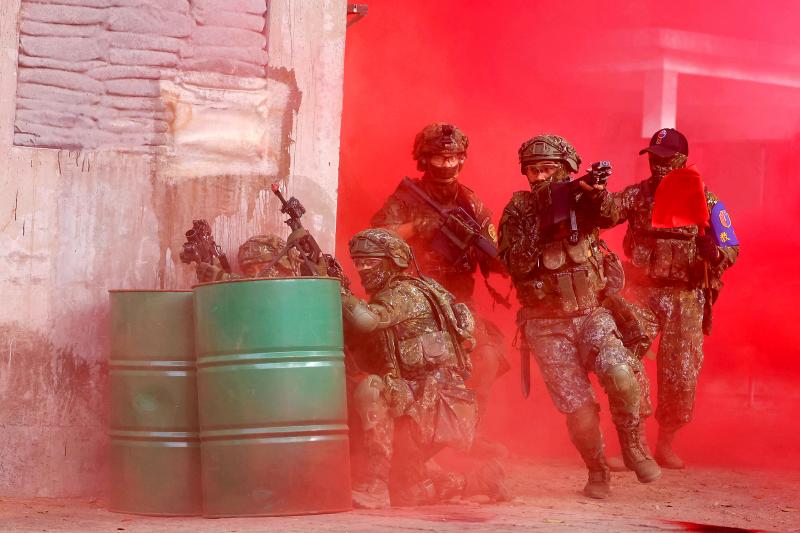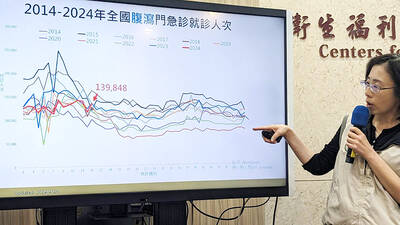A declining number of Taiwanese fear an imminent war with China, according to a new poll suggesting that the rest of the world is far more worried than those at the center of this potential geopolitical flashpoint.
According to the poll, published on Thursday by CommonWealth Magazine, 35.4 percent of respondents said that they were worried about a military conflict breaking out over the Taiwan Strait within the next year, a decrease of nearly 15 percentage points from last year’s survey.
The poll also found that 59.7 percent of people do not think Beijing will ultimately use force to take Taiwan, while more than 35 percent believed it would.

Photo: Ann Wang, Reuters
Some analysts see Chinese President Xi Jinping’s (習近平) “unification” pledge as a key goal of his legacy, but Taiwan says it is already a de facto independent nation.
In the year between the CommonWealth Magazine annual polls, China has markedly increased its rhetoric and actual intimidation of Taiwan, with record numbers of air force flights — part of Beijing’s warfare-adjacent “gray-zone” activity — into Taiwan’s air defense identification zone.
The survey results also showed high levels of trust in the US coming to Taiwan’s aid in the event of hostilities, with 54 percent of respondents saying that they thought the US military could effectively protect Taiwan.
Separately, 58.8 percent said that it was a possibility that the US would send troops to help Taiwan in the event of war.
The US sells billions of dollars in weaponry of a defensive character to Taiwan. Washington officials have also made statements suggesting it was likely to come to Taiwan’s aid militarily in case of conflict.
For decades the US has operated a policy of strategic ambiguity, neither confirming nor rejecting commitments to help, in an effort to deter provocative action by Beijing and Taipei.
Chinese Nationalist Party (KMT) Department of International affairs head Alexander Huang (黃介正) said that the results showed Taiwanese were in denial of the reality.
“China’s military threat is a fact Taiwanese are not willing to confront because it would incur real costs,” he told CommonWealth Magazine.
Huang Kwei-bo (黃奎博), a professor of diplomacy at National Chengchi University and former KMT deputy secretary-general, said that Taiwanese were perhaps unaware of the reality, due to a lack of specific military knowledge, and political messaging that the US would come to Taiwan’s aid.
“I think they have illusion about our capability and the US’ commitment to help Taiwan,” he said.
Confidence in US assistance varied according to age, CommonWealth Magazine reported, with those younger than 40 holding a more favorable view of the US.
Those older believed that China was stronger than the US and were thus more concerned about the prospect of war.
Marcin Jerzewski, a research fellow at Taiwanese think tank the NextGen Foundation, said that it was important to also recognize that Taiwan had made “considerable efforts to diversify its international relations.”
“Consequently, while the Taiwanese public believes that the US would come to its rescue if need be, [it] is also seeking to mitigate the risks from putting all its eggs in one basket,” he said.
Various polls over the past few years have measured Taiwan’s level or lack of fear over an attack or invasion, and countless opinions have sought to explain the findings.
In May last year, a survey of 1,000 residents found that more than 57 percent worried that war was a distinct possibility, shared across party lines and age demographics.
Taipei-based Seton Hall University law professor Margaret Lewis said that polls were dependent on the wording of the question, and particular local nuances and interpretations.
“A crucial question for Taiwan is how to build preparedness and resilience,” she said.
“How do you find that sweet spot of having people clear-eyed about threats and diligently preparing to be resilient in the face of those threats should they actually occur? You want them to be prepared, but also go about their lives,” she added.
As China’s military capabilities grow and its government becomes more isolated on the world stage, there is growing international concern of an attack or invasion attempt.
Last year, Minister of National Defense Chiu Kuo-cheng (邱國正) said that he believed China’s military would be fully capable by 2025.
Other analysts are more circumspect, suggesting that any potential attempt is much further away, but there is general consensus that the risk to Taiwan are higher than in previous decades, particularly with more gray-zone military activity, which has the potential to escalate.
Huang Kwei-bo said that he was “not as optimistic” as the 60 percent who did not fear imminent war, but did not think there was a high risk.
“The probability of [a] war, I think, is low, except those moments when our aircraft and PLA [Chinese People’s Liberation Army] aircraft approach each other,” he said. “During those 10 or 15 minutes, the probability of war rises.”

THE HAWAII FACTOR: While a 1965 opinion said an attack on Hawaii would not trigger Article 5, the text of the treaty suggests the state is covered, the report says NATO could be drawn into a conflict in the Taiwan Strait if Chinese forces attacked the US mainland or Hawaii, a NATO Defense College report published on Monday says. The report, written by James Lee, an assistant research fellow at Academia Sinica’s Institute of European and American Studies, states that under certain conditions a Taiwan contingency could trigger Article 5 of NATO, under which an attack against any member of the alliance is considered an attack against all members, necessitating a response. Article 6 of the North Atlantic Treaty specifies that an armed attack in the territory of any member in Europe,

FLU SEASON: Twenty-six severe cases were reported from Tuesday last week to Monday, including a seven-year-old girl diagnosed with influenza-associated encephalopathy Nearly 140,000 people sought medical assistance for diarrhea last week, the Centers for Disease Control (CDC) said on Tuesday. From April 7 to Saturday last week, 139,848 people sought medical help for diarrhea-related illness, a 15.7 percent increase from last week’s 120,868 reports, CDC Epidemic Intelligence Center Deputy Director Lee Chia-lin (李佳琳) said. The number of people who reported diarrhea-related illness last week was the fourth highest in the same time period over the past decade, Lee said. Over the past four weeks, 203 mass illness cases had been reported, nearly four times higher than the 54 cases documented in the same period

Heat advisories were in effect for nine administrative regions yesterday afternoon as warm southwesterly winds pushed temperatures above 38°C in parts of southern Taiwan, the Central Weather Administration (CWA) said. As of 3:30pm yesterday, Tainan’s Yujing District (玉井) had recorded the day’s highest temperature of 39.7°C, though the measurement will not be included in Taiwan’s official heat records since Yujing is an automatic rather than manually operated weather station, the CWA said. Highs recorded in other areas were 38.7°C in Kaohsiung’s Neimen District (內門), 38.2°C in Chiayi City and 38.1°C in Pingtung’s Sandimen Township (三地門), CWA data showed. The spell of scorching

HOSPITALITY HIT: Hotels in Hualien have an occupancy rate of 10 percent, down from 30 percent before the earthquake, a Tourism Administration official said The Executive Yuan yesterday unveiled a stimulus package of vouchers and subsidies to revive tourism in Hualien County following a quake measuring 7.2 on the Richter scale. The tremor on April 3, which killed at least 17 people and left two others missing, caused the county an estimated NT$3 billion (US$92.7 million) in damages. The Ministry of Economic Affairs is to issue vouchers worth NT$200 at the price of NT$100 for purchases at the Dongdamen Night Market (東大門夜市) in Hualien City to boost spending, a ministry official told a news conference after a Cabinet meeting in Taipei. The ministry plans to issue 18,400